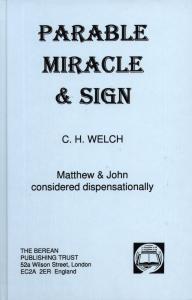Download PDF. See HTML file. Title is available from: Berean Publishing Trust |
Parable Miracle And Sign Charles H. Welch 236 pages In this book the Parables, Miracles and Signs contained in the Gospels of Matthew and John are considered from the dispensational point of view. Such great passages as The Sermon on the Mount, The parables of Matthew 13, The prophetic discourse of Matthew 24 and The eight ‘signs' in John's Gospel, have much fresh light brought to them. FOREWORD In order that every reader may understand what is intended by the term ‘dispensational significance’ we
adopt the following extract from chapter 2 of the book entitled Dispensational Truth. THE WORD ‘DISPENSATION’ By dispensational truth we mean that particular revelation of God’s will to man during some particular administration or economy, and specially appertaining thereto. When we speak of some teaching or practice as being undispensational, we mean that owing to the introduction of a new administration, certain things that obtained under a previous regime have become obsolete. By the term undispensational teaching, therefore, we mean that the teaching peculiar to one dispensation has been imported into another and differing dispensation, where the conditions of divine dealing render the practical application of such teaching quite inadmissible. If the above definition is accepted, it follows that should the parables, miracles and signs of the Gospels prove to be associated with ‘that particular revelation of God’s will’ which pertains to the kingdom of Israel or to a company other than the Church of the One Body, then the hope and the calling of the Church must be sought elsewhere. What that calling is, where it is revealed, what is its sphere of blessing, and wherein does it differ from that revealed in the Gospels, is not our present study; all we can say here is that it is the exclusive privilege of Paul as ‘The prisoner of the Lord’ for us Gentiles to make this new dispensation known, and that it lies quite outside of the revelation of God’s purposes that fill the Gospels with their blessed message. Seeing that the parables form an integral part of the Gospel that records them, and knowing what mischief attends the attempt to expound Scripture apart from its context, and moreover being certain that if our point of view is the true one, then it will stand the severest examination, we preface our study of the parables with a survey of the salient features of the Gospel according to Matthew, in order that the two sets of parables may be seen in their relation to the twofold scope of that Gospel. Similarly, before we examine the Eight Signs of the Gospel according to John, we again examine that Gospel in order to understand its dispensational place in the divine purpose. Neither parable, miracle, nor sign are found in the epistles of the Mystery (Ephesians, Philippians, Colossians and 2 Timothy) but a clear understanding of the true import of these wondrous words and deeds has many times proved the portal to the attainment of a fuller knowledge as to ‘What is the hope of His calling’ today. We accordingly, with this hope in mind, commend the following pages to the reader, praying that above all things that such may manifest that true nobility of mind that earned the commendation of the Lord by the ‘Bereans’ of old, in that they ‘searched’ the Scriptures ‘to see’ that these things were ‘so’. |
|
|
